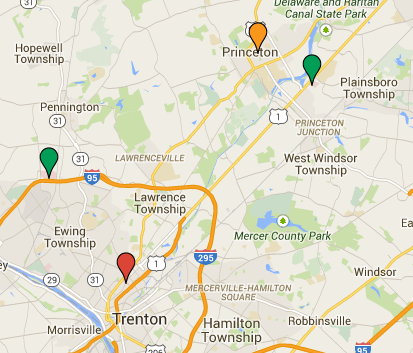Seven Survey Results Where Afghanistan Outperforms the USA
Published:
Alternative internet tabloid title: “7 Ways Afghanistan Kicks America’s Butt!”
Unemployment, insecurity, and corruption, are the biggest challenges facing Afghanistan according to the ASIA Foundation’s 2014 survey. The fraud allegations and controversial recount of the presidential run-off election might have made the list, but the survey ran before the preliminary vote totals were released.
Even before the elction though, pessimism was on the rise. The survey found that 40% of Afghans believe the country is moving in the wrong direction, a new high since the ASIA Foundation began surveying in 2004. If you are keeping up with US politics however, that number doesn’t look so bad. Throughout 2014, over 60% of Americans have reported that the country is headed down the wrong track.
Of course, when comparing across surveys you have to account for many factors such as different methodologies, sampling limitations, exact phrasing, and cultural significance. We cannot say that America’s track is more wrong than Afghanistan’s, whatever that even means. However, I believe these comparisons should make us think about both the face value comparison (why might Americans be more pessimistic?) and the issues of doing such a comparison in the first place (how is the data shaped by differences in culture, society, history, politics, economics, linguistics, and the survey methodology itself?).
With the goal of promoting additional thinking, I present the seven survey results where Afghanistan outperforms the USA:
1. Right Direction
On the other side of wrong-track coin, 54.7% of Afghans believe that the country is moving in the right direction. This is a slight dip from 2013, but overall still seems to be on a steady climb since 2008. In the United States you have to go back to 2009 in the Reuter’s Poll or 2003 in the NBC News/Wall Street Journal Poll to find that level of optimism in the US (see graph by Marist Poll).
2. Property Crime
Security is a major concern in Afghanistan; 16% of respondents report that they or someone in their family had suffered from violence or crime in the past year. Overall, violent acts (beatings, suicide attacks, murder, kidnapping, militant action, etc.) were more prevalent than property crime (Racketeering, livestock theft, pick-pocketing, burglary, vehicle theft). Between 6.5 and 13% of respondents reported some type of property crime (exact unknown because respondents were allowed to report two types). In comparison, the violent crime rate in the US in 2013 was only 2.3% according to the USA’s Bureau of Justice Statistics (BJS). However, the US may have a slightly higher rate of property crime - 13.1% of households.
3. Crime Reporting
The first response on property crime might be about what incidents go unreported. While Americans and Afghans may have different ideas on what constitutes a criminal act, as it is Afghanistan has a higher reporting rate than the US. The BJS estimated that Americans reported 46% of violent crime and 36% of property crime to police. In Afghanistan reporting of crime or violence increased this year to 69%.
4. Confidence in the Police
The difference in crime reporting may be related to each country’s confidence in their police. When a 2014 Gallup poll asked Americans how much confidence they have in the police 53% selected a great deal or quite a lot versus the other choices: some, very little, or none. The ASIA Foundation’s survey found 73.2% are confident in the Afghan National Police (ANP). This is using a composite measure of people that agree strongly or agree somewhat with three statements: the ANP (a) is honest and fair (b) improves security and (c) is efficient at making arrests. As more direct comparisons, 86% of Afghans strongly agreed or somewhat agreed that the ANP improve security; according to a Pew Poll 83% of Americans said that police were excellent, good, or only fair at protecting people from crime. Similarly, 88% of Afghans at strongly or somewhat agreed that the ANP is honest and fair, while 74% of Americans gave the police a fair or better rating at treating racial and ethnic groups equally.
5. Confidence in the Army
The higher levels of confidence in the police may be related to their role in fighting the insurgency. The Afghan National Army (ANA) similarly garners a high level of confidence. Using a composite measure again, 86.5% of Afghans agree strongly or agree somewhat with all three of the three following statements: that the ANA (a) is honest and fair (b) improves security and (c) protects civilians. The most recent 2014 Gallup Poll found 74% of Americans have a great deal or quite a lot of confidence in the US military.
6. Confidence in the Legislature
In 2013 the US congress’ ratings hit record lows; a Public Policy Polling survey found that Americans had higher opinions of root canals, head lice, traffic jams, cockroaches, and Nickelback. Gallup polls that year found that 10% of Americans had a great deal or quite a lot of confidence in Congress. This number dipped to 7% in 2014. Afghanistan cleanly clears this low bar with 12% reporting a lot of confidence in parliament as a whole.
7. Fair Elections
Before the announcement of the run-off election and the subsequent allegations of sheep stuffing and disputes over unity governments, the Afghan people were quite bullish on the elections. When asked about them, 63% responded that they were in general free and fair. If you ask likely American voters, only 40% think elections are fair to voters. Given what has happened since the US may have taken back the lead on fair-election perceptions, but that’s still not something to brag about.


 Map of past and current hospitals in the Princeton area.
Map of past and current hospitals in the Princeton area. University Medical Center of Princeton at Plainsboro: curved for your health
University Medical Center of Princeton at Plainsboro: curved for your health